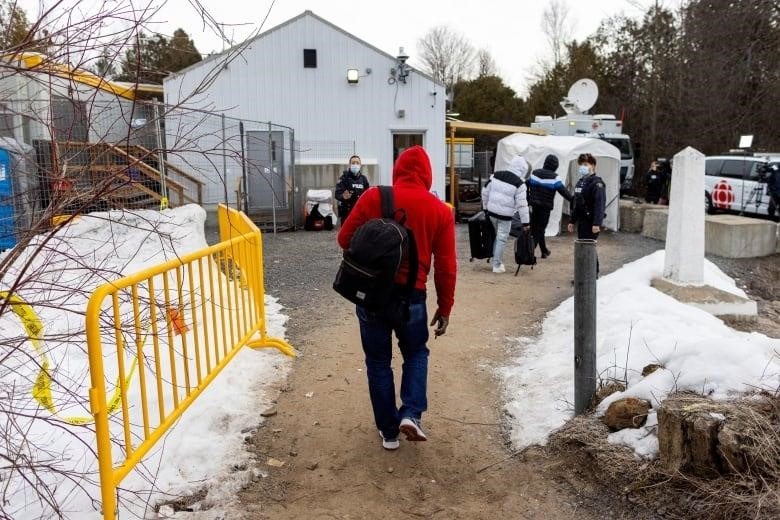
When people cross at Roxham, they risk never being able to ask for asylum in Canada again
Even though strict new border rules between Canada and the U.S. mean that most of these people would probably be sent back to the U.S. and never be able to claim asylum in Canada again, they kept trying to cross into Canada at Quebec’s Roxham Road over the weekend. They arrived on buses in the town of Plattsburgh, N.Y., from Quebec.
On Saturday afternoon, a bus from New York City brought about 15 people from places like Colombia, Venezuela, Haiti, and the Democratic Republic of the Congo. Less than 12 hours before, another group had arrived, only to find out that under the new agreement, they would not be allowed to enter Canada unless they met one of the few exceptions.
Most of the dozen or so people who were still coming to the border crossing did not know that Roxham Road was no longer a way to get into Canada. Since the beginning of 2022, about 44,000 people have used Roxham Road to get into Canada.
Friday afternoon, Prime Minister Justin Trudeau and U.S. President Joe Biden announced that the Safe Third Country Agreement would be renegotiated starting at midnight. Under the new agreement, people who cross Canada’s land border can no longer ask for asylum. Those who do it illegally can’t ask for asylum for 14 days, as long as they can prove when they did it.
Immigration experts and advocates have spoken out against the new rules, saying that they will force people to go underground and take dangerous risks. They also say that it will be harder for first responders to keep an eye on and help migrants trying to cross Canada’s nearly 9,000 km long border. In the past few months, two men have died trying to get from Canada into the U.S.
The Saturday bus didn’t arrive until less than 12 hours after theheartbreakOf migrants arriving at the Mountain Mart gas station at 4 a.m., after the midnight deadline, only to find out they could be turned away.
The agreement and its effects have been talked about a lot less in American publications than in Quebec and Canadian ones.
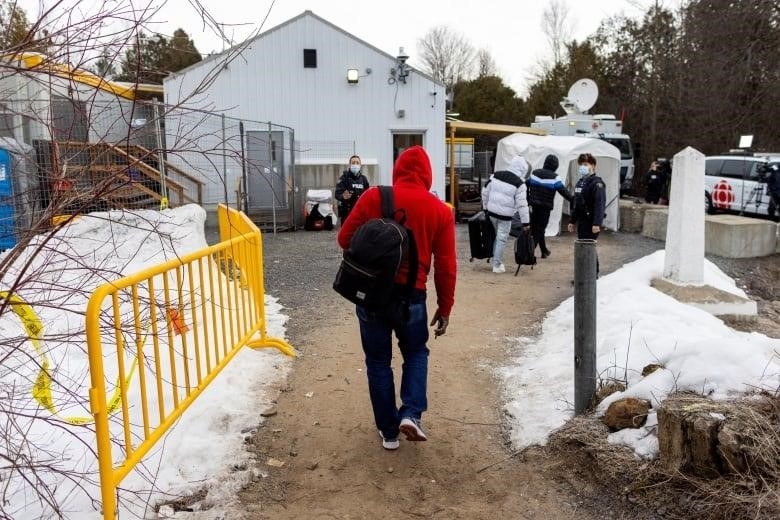
One couple from Colombia didn’t know what to say when they heard the news. They had spent a lot of money to get their child this far. Even though it was beginning to snow, many people were still wearing summer clothes. A man from Angola was wearing sandals, and a girl was in flats.
Several people decided to take one of the few taxis still going from the bus stop to Roxham, which is about 30 km away. U.S. officials warned taxi drivers in Plattsburgh that border patrol could arrest them if they kept taking people to the border after midnight on Saturday. However, some drivers have chosen to keep doing it anyway.
On Sunday, a young couple from Venezuela was one of about 20 people who took one of those rides to Roxham after the bus that day.
While the others walked down the short path across the border, where an RCMP officer was arresting them and leading them into the warehouse where other migrants were waiting to be processed, the couple stayed put.
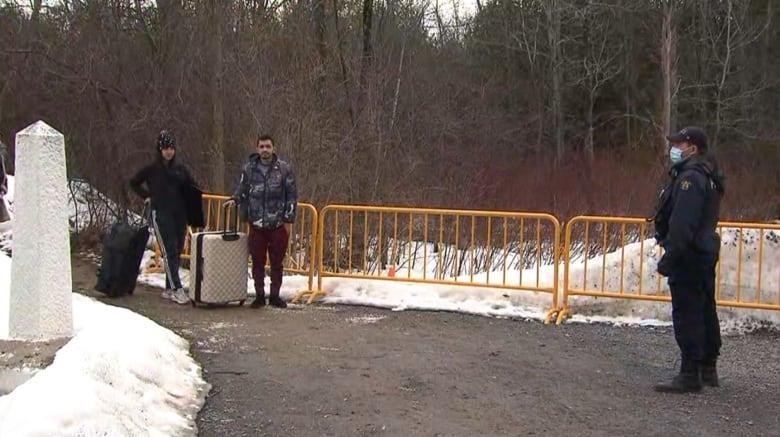
For about eight minutes, they didn’t want to cross. At one point, the man asked the officer if being sent back to the U.S. was really the worst thing that could happen.
The RCMP agent said, “You need to ask immigration. I’m a police officer.” No one from immigration services was there.
At Roxham, there have been few or no official ways for migrants to learn about the risks they face if they decide to try their luck.
At midnight on Saturday, when the deal went into effect, a sign was put up. It says, “Stop. Do not cross. From here, it is against the law to go to Canada. You will be arrested, and you might be sent back to the U.S. People who want to be protected as refugees must do so in the first safe country they reach.”
What RCMP officers tell people walking down the path, on the other hand, didn’t seem to change. As before, they tell people that they are breaking the law by going into Canada and that they are going to be arrested.
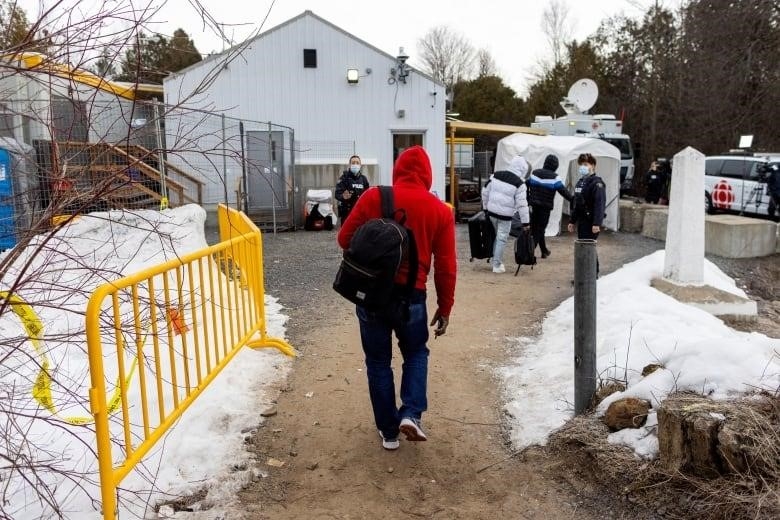
They now also point to the sign. The only other difference is that, once inside, migrants who don’t qualify for an exception to the new agreement are taken to a checkpoint where U.S. border patrol agents either arrest and detain them or let them into the country. On Saturday and Sunday, the police didn’t tell people that.
The only people who don’t have to follow the agreement are asylum seekers with legal family members in Canada, unaccompanied minors, and people who already have a visa or work permit for Canada.
After about five more minutes, the couple from Venezuela walked across. On the Canadian side of the border, a CBC reporter asked the man why he had made that choice.
“We’d like to take that 1% chance. We want to take a chance because we don’t know what else to do “he said. “It’s better than where we live.”
Stéphanie Valois, the president of the Quebec association of immigration lawyers (AQAADI), said she doesn’t think the people trying to cross the border know that if they do so, they will lose the right to apply for asylum in Canada in the future.
Valois said over the phone Sunday night, “Never, ever again.” “I don’t think most people know that.”
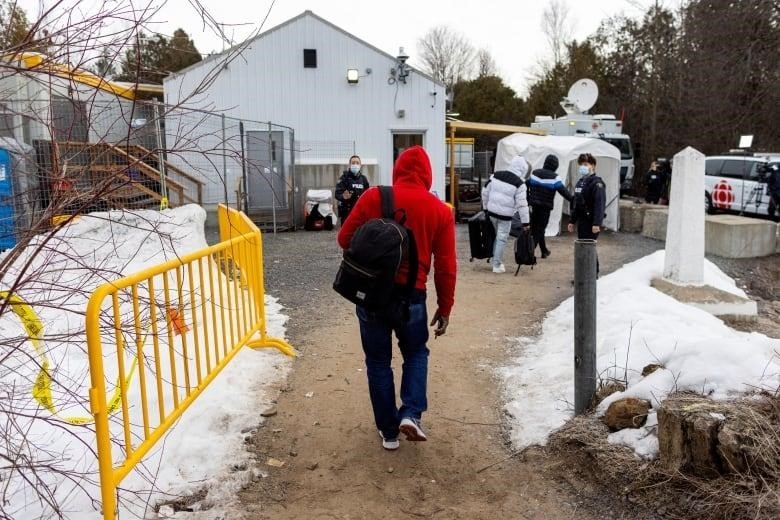
She said that in the past, some migrants who were found to be ineligible were able to stay in the country after their lawyers asked for an assessment of the risks of sending them back to their home country. However, she said that these cases are rare.
The Canadian Border Services Agency says that between 12:01 a.m. Saturday and noon Sunday, two people were sent back to the U.S. and four people’s requests for asylum were denied because they did not meet the requirements.
A volunteer for a group called Bridges Not Borders, Frances Ravensbergen was on the Canadian side of Roxham on Sunday. She usually gives migrants in the U.S. gloves or socks. She says this is her way of being a witness at the illegal border crossing in the country.
Ravensbergen Was shocked that the Canadian and U.S. governments made the decision without talking to groups that work directly with migrants.
She said, “No one was ready for this, but they still had time to make a sign.”
